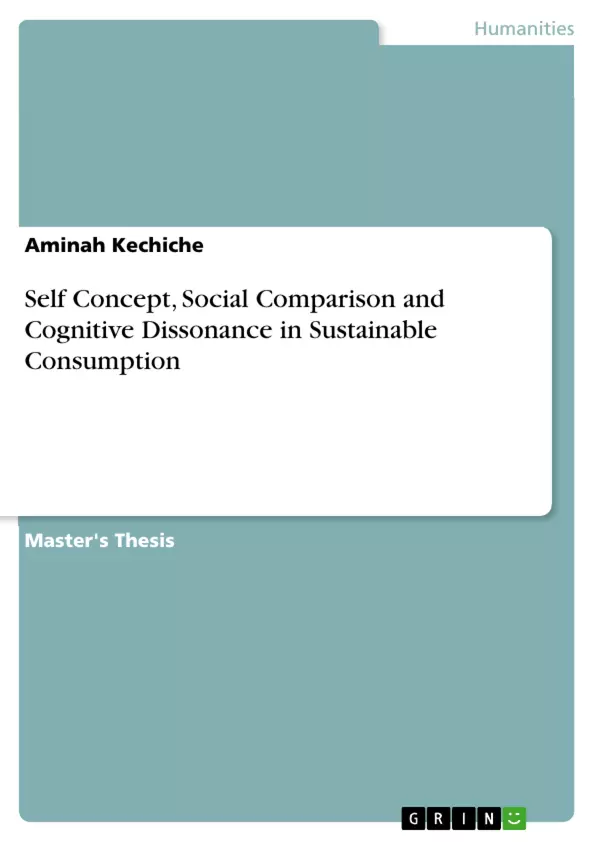The paper aims to analyse consumer behaviour and the drivers of sustainable consumption, which can assist businesses and policymakers to encourage consumers towards more sustainable behaviours and lifestyles. It will therefore analyse how nudging consumers about social and environmental issues could effectively steer them towards the sustainable option instead of the non-sustainable alternative when evaluating purchase decisions.
This involves highlighting the perceived importance of sustainability for the self and within society by making consumers mindful of personal and social norms and values. This in turn, can create positive spillover effects to other pro-environmental behaviours especially when these personal norms are strengthened. This research aims to investigate how cognitive dissonance can be reduced in order to encourage sustainable consumption, with this being the basis of the theoretical framework.
Inhaltsverzeichnis (Table of Contents)
- 1. Introduction
- 2. Literature Review
- 2.1 Sustainable Consumption Behaviour
- 2.2 Cognitive Dissonance Theory
- 2.3 Self-Concept Theory
- 2.4 Social Comparison Theory
- 3. Empirical Analysis and Conceptual Framework
- 3.1 Cognitive Dissonance & Self-Concept Relating to Sustainable Consumption
- 3.2 Vicarious Dissonance & Social Comparison Relating to Consumption
- 3.3 Conceptual Framework
- 4. Methodology
- 4.1 Data Collection
- 4.2 Data Analysis
- 5. Findings
- 5.1 Research Results
- 5.2 Result Interpretation & Discussion
- 6. Conclusion and Recommendations
- 6.1 Summary & Conclusion
- 6.2 Recommendations
Zielsetzung und Themenschwerpunkte (Objectives and Key Themes)
This Master's thesis examines the interplay of self-concept, social comparison, and cognitive dissonance in the context of sustainable consumption. The aim is to investigate how these psychological factors influence individuals' choices and behaviors related to sustainability. The study explores the potential for applying these theories to promote more environmentally friendly consumption patterns.
- Sustainable Consumption Behaviour
- Cognitive Dissonance Theory
- Self-Concept Theory
- Social Comparison Theory
- Empirical Analysis of the Relationship between Psychological Factors and Sustainable Consumption
Zusammenfassung der Kapitel (Chapter Summaries)
The thesis begins by providing a comprehensive overview of the literature on sustainable consumption behaviour, cognitive dissonance theory, self-concept theory, and social comparison theory. Chapter 3 then delves into the empirical analysis and conceptual framework, exploring the connections between cognitive dissonance and self-concept in relation to sustainable consumption, and the role of vicarious dissonance and social comparison in consumer choices. Methodology and data analysis techniques employed in the study are detailed in Chapter 4. The findings and their interpretations are presented in Chapter 5, focusing on the relationship between psychological factors and sustainable consumption behaviors. The conclusion and recommendations are expected to provide a synthesis of the research findings and suggest practical implications for promoting sustainable consumption patterns.
Schlüsselwörter (Keywords)
The study focuses on the interplay of self-concept, social comparison, and cognitive dissonance in influencing sustainable consumption behavior. Key terms include sustainable consumption, cognitive dissonance, self-concept, social comparison, vicarious dissonance, empirical analysis, and research methodology. The study aims to contribute to the understanding of how these psychological factors can be leveraged to promote environmentally responsible choices and behaviors.
Frequently Asked Questions
What is the central theme of this Master's thesis?
The thesis explores how psychological factors like self-concept, social comparison, and cognitive dissonance influence sustainable consumption behaviors.
How can "nudging" help in sustainable consumption?
Nudging involves making consumers mindful of personal and social norms, steering them toward sustainable choices without restricting their options.
What is Cognitive Dissonance in the context of sustainability?
It refers to the mental discomfort consumers feel when their purchasing actions (non-sustainable) conflict with their environmental values (sustainable).
What role does "Social Comparison" play in green behavior?
Social comparison theory suggests that individuals evaluate their own sustainability efforts based on the behaviors and norms of their social circle or society.
What is "Vicarious Dissonance"?
The thesis explores vicarious dissonance as a form of social influence where observing others' inconsistent behaviors affects an individual's own consumption choices.
- Citation du texte
- Aminah Kechiche (Auteur), 2019, Self Concept, Social Comparison and Cognitive Dissonance in Sustainable Consumption, Munich, GRIN Verlag, https://www.grin.com/document/1037800



